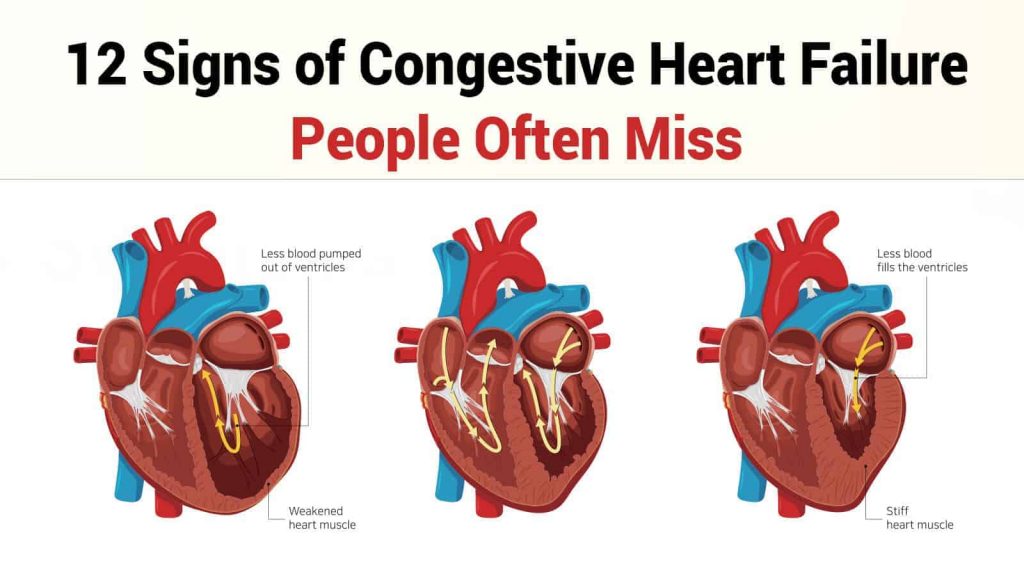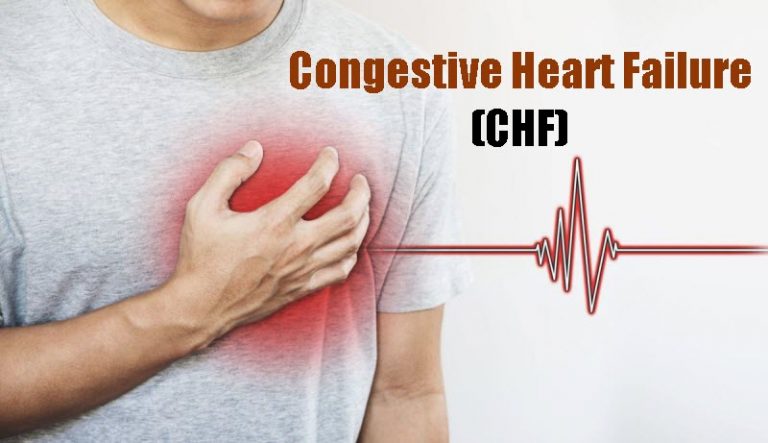12 Congestive Heart Failure Symptoms – Causes, Diagnosis, Treatments & Preventions
Congestive Heart Failure Symptoms – Cardiovascular diseases are a big problem for the world. It is among the leading causes of death. The World Health Organization believes cardiovascular disease takes 17.9 million lives each year.
Even the Centers for Disease Control and prevention of the United States have several programs to teach the general public about cardiovascular health. The rising population of obese and overweight people in the United States is also becoming one of the biggest reasons for the rising numbers of people with cardiovascular diseases.
As per the latest data points released by the Centers for Disease control and prevention, The United States can have more than 45% obese population by the year 2025. That is why today we are here to discuss congestive heart failure symptoms. Obesity is among the biggest causes of the condition, and you need to learn everything about it.
Table of Contents
What is congestive heart failure?
Congestive heart failure is a chronic progressive condition that is going to get worse over some time. During the condition, your heart muscle does not pump up blood as well as it normally should.
Generally, congestive heart failure is known as heart failure, and it’s a very common issue in the United States and all around the world. During this condition, your heart will fail to pump enough blood volume into the body.
As a result, the fluids will keep getting back up inside several organs, including the lungs, abdomen, liver, and lower body. Congestive heart failure is a life-threatening condition, and you should never ignore a disease like that. If you are experiencing any of the below-given symptoms of congestive heart failure, then you should consult with your health care provider as early as possible.
Causes of congestive heart failure
Before we move to symptoms or anything else, let’s first discuss the major causes of congestive heart failure. The Centers for Disease Control and Prevention suggest everyone in these categories make sure they are taking good care of their health and consulting with their health care provider.
Ignoring these causes can cause heart failure, and it can result in death. Here are the top causes of congestive heart failure.
- High blood pressure
- Faulty heart valves
- Damage to the heart muscle
- Heart attack
- Inflammation of heart muscle
- Abnormal heart rhythm
- Ethnicity
- Sleep disorders
- Uncontrolled diabetes
- Anti-inflammatory drugs
- Viral infection to the heart muscles
- Obesity
- Alcohol consumption
As you can see in the above-given list, there are several major causes of congestive heart failure, and people who fall in any of the above-given categories should make sure they are consulting their heart health with their health care provider regularly.
People who are already struggling with any heart disease, including heart attack, stroke, fat deposits in arteries, and high blood pressure, should consult with their health care provider as early as possible.
Those people should also take a deep look at every symptom of congestive heart failure and not ignore any of them. Congestive heart failure is known to cause millions of deaths each year, even in the United States.
You might not realize it, but things like obesity, tobacco, and alcohol also impose a huge risk of developing heart failure.
Congestive heart failure symptoms

Let’s move to the main topic of the day, which is congestive heart failure symptoms. The Centers for Disease Control and Prevention suggest every American take a deep look at the pauses and symptoms of congestive heart failure.
The cases of congestive heart failure are rising at rapid speed in the United States and becoming one of the leading causes of death in the country. Take a deep look at every symptom.
- Shortness of breath
- Extreme fatigue and weakness
- rapid heartbeats
- Swelling in the legs, ankles, and feet
- Reduce the ability to exercise
- rapid Weight gain from fluid buildup
- Persistent cough
- Swelling in the belly
- Difficulty concentrating
- Nausea
- Lack of appetite
- Chest pain
The Centers for Disease Control and Prevention of the United States suggest everyone consult with their health care provider as soon as they start experiencing any of the above-given symptoms and they fall in the cause category.
For example, if you are an obese person and you start experiencing swelling in your legs along with shortness of breath, then you should consult with your health care provider as you might be struggling with heart disease.
Similar things also apply to people who already have a history of similar diseases or whose family has a history of heart disease, and they should consult with their health care provider if they start experiencing chest pain, shortness of breath, fatigue, etc.
Diagnosis of congestive heart failure
There are several tests to diagnose congestive heart failure starting with a regular physical examination. Your healthcare provider will be able to diagnose any heart failure symptoms by just taking a look at your medical history and current condition.
If your doctor believes you have some symptoms that might be associated with heart failure and you also fall in the high-risk category, then your doctor might suggest you go for an electrocardiogram.
Electrocardiogram
An electrocardiogram is a painless and quick test to record the electrical signals in the heart. It is among the most popular tests in the world to determine the timing and length of heartbeats.
Echocardiogram
Apart from that, your doctor might also suggest that you go for an echocardiogram. It is a popular test to produce images of the heart in motion using sound waves. Echocardiograms can easily create a picture of your heart for your doctor to analyze the condition of your muscles.
Advanced tests
In case your Dr believes these tests are not enough to diagnose any heart condition that you might be having, then your doctor might suggest you go for an MRI and CT scan.
In a cardiac CT, A big donut-shaped machine will collect images of your chest. These images will help your health care provider determine the exact shape and size of your hard. Apart from that, it can also tell how much blood flow your heart has.
Apart from that, you might also get suggested to get an MRI. Before both of the tests, you should tell your doctor if you are struggling with any disease, including kidney disease. These machines are known to affect kidney function, and people who are already struggling with kidney diseases might experience symptoms.
Treatment of congestive heart failure
Congestive heart failure is a chronic disease, and the person who has been affected by the disease will require lifelong management. There are some treatments available for the condition, but every treatment will focus on reducing the intensity of symptoms and preventing further complications.
Your doctor will suggest that treatment depending on your condition and history of cardiovascular diseases.
Medicine
Most people who are struggling with any heart disease might have to take medicine for the rest of their life. Beta-blockers are known to reduce the rate of heart and blood pressure. It is among the best medicine for people who are struggling with hybrid pressure.
Apart from that, there are several other medicines, including positive inotropes, Receptor blockers, Ace inhibitors, etc. your doctor will suggest to you the medicine depending on your condition and history with similar diseases.
Surgery
In some cases, your doctor might suggest he go for heart surgery. Usually, doctors suggest heart surgery to patients who are not getting better with regular medicine.
Coronary bypass surgery is among the most popular heart surgeries in the world. Your doctor will try to unblock severely blocked arteries which might cause heart failure. During the surgery, your doctor will take care of a blood vessel from your leg, arm, or chest and connect it to block the arteries to improve the blood flow.
Prevention of congestive heart failure
The World Health Organization, along with every other health expert, suggested that the general public stay away from heart diseases as much as possible. We should try to prevent the disease as it is easier to prevent than treat.
Diseases like congestive heart failure or millions of deaths around the world, but there are some factors that you can control to eliminate the risk of developing heart failure.
- Do not smoke
- Control of heart disease is
- Control diabetes
- Stay physically active
- Eat healthy food
- Maintain healthy weight
- Reduce stress
With the above given seven-step formula, anyone in the world can lower the risk of congestive heart failure. The condition is also increasing in youngsters as young as 19 years.
Are there any home remedies for congestive heart failure?
Yes, there are some lifestyle and home remedies you can use to lower the risk of congestive heart failure. First of all, you should stop smoking, start eating healthy food and maintain a healthy weight. Apart from that, you can also discuss every possibility with your healthcare provider.

